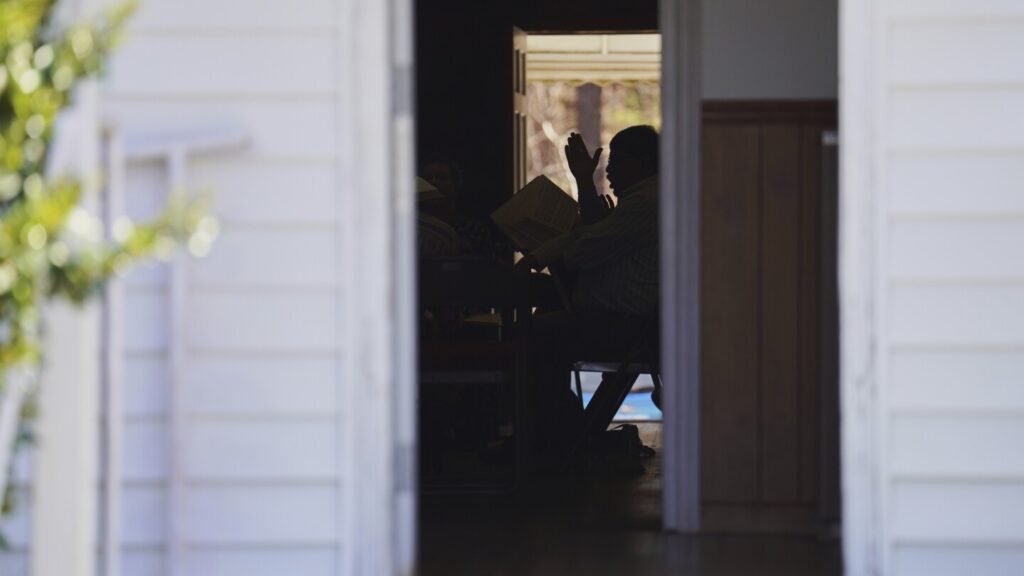BREMEN, Ga. (AP) — “The Sacred Harp” hymnal is beloved by those who sing from it, carrying on the Christian songbook’s more than 180-year-old legacy.
They are young and old — and all ages in between. Some have been singing from the hymnal all their lives, just as their parents and grandparents had done before them. Others became immersed in the shape-note singing tradition as adults and found fellowship as well as music.
As the Sacred Harp community awaits the latest edition of their songbook, here’s a look at who these singers are and why this a cappella group practice is important to them.
The sacredness of ‘The Sacred Harp’ for many singers
For Isaac Green, Sacred Harp singing is not a hobby — it’s spiritual.
“Sacred Harp singing is my church,” said Green. “I get much more out of listening and thinking about the words I’m singing than I do anybody preaching to me.”
Green grew up in Knoxville, Tennessee, singing out of a different shape-note hymnal. He discovered “The Sacred Harp” much later, while living in Alpharetta, Georgia.
“There are definitely some people that have very different beliefs than me, have very different upbringings, have very different day-to-day lives, but when we come together and sing … that can be our one thing that we are in unison over,” he said.
Finding singing in the ‘backwoods of Alabama’
More than 20 years ago, Bridge Hill Kennedy was burned out by music ministry when he joined his sister-in-law at a Sacred Harp singing event. Unfamiliar with the tradition, they looked up YouTube videos beforehand.
“We went into the backwoods of Alabama, and there it was, some of the most beautiful music that I’ve ever heard,” he said.
Today, it feeds his soul and boosts his mood.
“This community means the world to me,” Kennedy said. “I’ve met people that I never would have met … and that has given me a greater opportunity to love, even difficult people — opportunities that I would not have had otherwise and I’m grateful for that.”
An inherited family tradition
Sacred Harp singing is a family tradition for Reba Dell Windom. Growing up, it’s how she spent her weekends.
“I don’t remember learning to sing. I just thought, well, I could always sing,” said Windom, who has stuck with it throughout her lifetime, loving the fellowship and the practice. She views “The Sacred Harp” hymnal as a special book deserving of respect, like the Bible.
Windom has her grandfather’s and her dad’s old songbooks. Singing makes her feel close to them, especially when she leads a group of singers through a hymn they used to lead at singing events.
“I like to lead them, and sometimes it makes me cry, but it’s just memories,” she said. “There’s quite a few that would be considered my favorite.”
A young girl’s songbook
Eleven-year-old Riley McKibbin received her copy of “The Sacred Harp” from her family with its long line of Sacred Harp singers.
At the front of her songbook, a handwritten note dated Aug. 6, 2017, reminds her of that.
Riley, who likes how “everybody comes together and they can just sing Godly songs for God,” has attended Sacred Harp singing events since she was a baby. For a few years now, she’s served as a song leader, taking her turn guiding the group and keeping time.
Riley’s mother, Lisa Webb, said her daughter has always loved to sing, and it was important to have her share in the family tradition.
Songs remind singer of special people in his life
Specific hymns in “The Sacred Harp” remind Oscar McGuire of singers in his life, including those no longer living. He’ll often lead those songs at singing events.
“I’ll get hung up on two or three songs and lead the same songs every Sunday,” he said. “I’ll sing them kind of in their memory.”
There’s No. 485 “New Agatite” and No. 573 “Harpeth Valley” that remind him of the late Hugh McGraw, an influential Sacred Harp singer, and several that make him think of the late Charlene Wallace, another stalwart singer. No. 515 “Joyful” is his wife’s favorite.
“I get a message out of the songs. Most all of them come from verses in the Bible,” he said. “I would rather go and sing all day, rather than going to church and listening to a preacher for 30 minutes.”
Reluctant singer now immersed in the tradition
Today, Nathan Rees is immersed in the Sacred Harp community. Not only is he a singer, he also is the curator of the Sacred Harp museum in Carrollton, Georgia, and a member of the revision committee working on the upcoming 2025 edition.
But Rees didn’t start out so enthusiastic; he was skeptical when his parents introduced him to it while he was in Utah during college.
“They had to talk me into going to this weird thing they were doing and loving with strange adult friends of theirs that I had never met and had zero interest in whatsoever,” said Rees, who remembers well that first singing he attended.
“I just got into it and loved it.”
___
Associated Press religion coverage receives support through the AP’s collaboration with The Conversation US, with funding from Lilly Endowment Inc. The AP is solely responsible for this content.
Read the full article here


